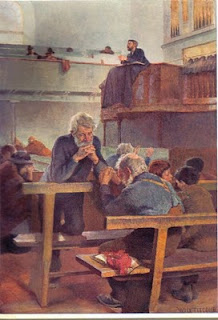(or the butler is more fierce than the king)
(or how the Primitive Methodists obtained a site for a chapel)
Occasionally it happened that the difficulty in obtaining a site for a Primitive Methodist chapel was due to the intolerance of an agent, and when the applicants managed to get past the underling to the great man himself, all troubles ceased.
This story is from Bowlees, near Middleton-in-Teesdale, in the north east of England.
All requests to the owner of the desired land, the Duke of Cleveland, had been fruitless. After much prayer, a sturdy Yorkshireman, Willie Wilkinson, resolved to present his plea personally to the landlord, shrewdly suspecting that as yet his Grace knew nothing of the matter. The Duke was staying with a shooting party at High Force Inn, and Willie Wilkinson was, of course, refused admission. Brushing past the Duke’s servant, Willie made his way to the Duke, and began the interview by grasping his Grace’s hand, with the inquiry:
‘How are ye Mister Duke, an’ how’s Missis Duke?’
Happily the Duke was not without a sense of humour, and took in the situation, so that Willie was asked to state his business.
“Ah want a bit o’ground, Mister Duke, to build a Primitive Methodist chapel on. An’ it’s not the first time we’ve asked for it neither, Mister Duke. Ah’ve sent paper after paper myself, an’ never gotten any word back.’
The agent admitted the truth of the statement, excusing himself on the ground that he had never deemed it of sufficient importance to lay before his Grace.
Willie could contain himself no longer. ‘Ah always thought that was t’way it was. Ah’ve never spoken to ye in my life before, but ah was sure ye were a decent sort of a man. Ah always thought it was them nasty bodies about ye.’
Willie intimated further that if they could get a few poachers converted in the new chapel, his Grace would be ‘obliged’ to them.
‘You shall have a piece of land, most certainly, my man,’ said the Duke.
‘Thank ye, Mister Duke,’ was Willie’s prompt response.
‘Where would you like to have it?’
‘Mister Duke,’ replied Willie, in his most insinuating manner, ‘there’s a bit o’ ground down yonder in the corner of the pasture, it grows nowt, it never growed nowt, it grows nowt but weeds, but it’ll do very well for a chapel.’
The Duke promptly granted the site, and at once instructed his agent to meet Willie at nine o’clock next morning to stake out as much land as Willie desired. Willie was on the spot in good time, with a bundle of stakes ready for staking out. Then the steward arrived.
“Thou’s come then,’ was Willie’s caustic greeting. ‘Ah thought thou would come. Thou didn’t dare but come when t’ Duke tells thee. But ah have thee now. Does thou see them stakes? Thou’ll put them in just where ah tell thee. T’ Duke said ah was to have as much ground as ah wanted.’
Meekly the agent followed Willie from point to point, until an ample site had been staked out, and Bowlees chapel stands today a monument of the sturdy Yorkshireman’s ‘holy boldness’.
Abridged from The Romance of Primitive Methodism, Joseph Ritson, pp. 133 -134.











